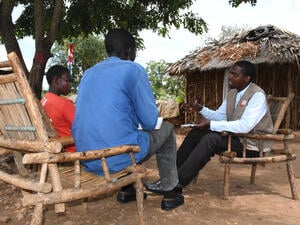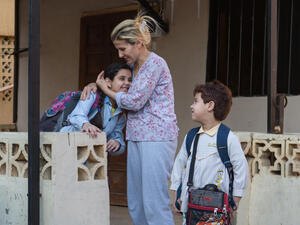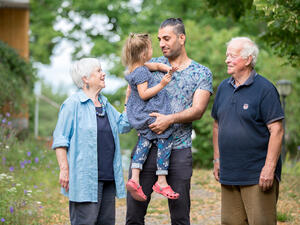"In the war on AIDS refugees are often excluded" - Ruud Lubbers
"In the war on AIDS refugees are often excluded" - Ruud Lubbers

Young refugees taking part in an awareness-raising campaign on HIV/AIDS in Nangweshi camp, Zambia.
By Ruud Lubbers
GENEVA - The trauma of war, violence and persecution followed by the misery of exile are often the sad destiny of refugees. In parts of the world affected by HIV/AIDS the plight of the uprooted is even worse. Not only are refugees accused of spreading HIV and other diseases but they are often excluded from multi-million-dollar HIV/AIDS programmes designed to combat the global scourge.
Stigmatizing refugees as HIV carriers is morally repugnant. It is also grossly unfair. Recent studies show that
in some AIDS stricken countries, refugees have lower HIV prevalence rates than the surrounding populations that host them. They also recommend that refugees should always be included in the host countries' efforts to fight AIDS. Excluding them from HIV/AIDS programmes is highly discriminatory and epidemiologically counterproductive.
Of the 29 countries in Africa that host more than 10,000 refugees, only 35% have outlined activities for refugees in their National Strategic Plans. The Global Fund to Fight AIDS, Tuberculosis and Malaria (GFATM) and the Multi-Country HIV/AIDS Programmes of the World Bank have funded HIV/AIDS projects in 24 of these 29 countries that between them host millions of refugees. But less than half of those proposals actually included refugees.
What it means in practice is that large numbers of refugees are effectively barred from policies and programmes that benefit the populations which host them. This is morally unacceptable and nonsensical in a public health sense, as one cannot seriously combat the spread of HIV and at the same time ignore a segment of the population within a country affected by it.
Over the last two years, UNHCR and its partners have worked with refugees to improve HIV/AIDS programmes for refugees. However, our funds are limited. Also, it is the host governments who are ultimately responsible for the protection and well-being of refugees on their soil. This includes effective measures to prevent the spread of HIV amongst the uprooted. Addressing only the needs of their own citizens, while ignoring those of refugees who daily interact with them is a contradiction in HIV/AIDS prevention and care strategies.
HIV/AIDS programmes should address both groups and be integrated and well-coordinated. Host governments should begin by ensuring that specific programmes for refugees and the local surrounding communities are included in their HIV/AIDS national strategic plans and policies. They also must make sure that these policies are actually enforced at the district level.
Part of the responsibility rests with the donor community who must ensure that refugees are not excluded from HIV/AIDS programmes. GFATM and the World Bank should insist that the programmes they fund include all vulnerable groups, including refugees.
The development of integrated HIV/AIDS strategies would be given an enormous boost if donor governments would loosen current restrictions on funding so money can be used more flexibly to provide HIV/AIDS programmes to both refugees and local communities. This is currently being done in Uganda, where a self-reliance strategy has ensured that numerous HIV/AIDS activities, including voluntary counselling and testing, are available to both nationals and refugees.
The international community must adopt a broader and more innovative approach to fighting the HIV/AIDS epidemic across international boundaries. Recent conflicts in Liberia and Congo, for example, saw refugees (and soldiers) moving across many borders in West and Central Africa, respectively. The World Bank is currently attempting to address this issue by funding a unique programme with six African governments called the Great Lakes Initiative on HIV/AIDS.
The past few years have seen remarkable progress in efforts to stop the spread of HIV and treat its devastating effects. Prevention measures such as sensitizing people to the routes of transmission and changing their behaviour to enable them to protect themselves from infection are common and becoming more sophisticated. Antiretroviral medications are now more affordable in developing countries and efforts are being made to scale up treatment. The World Health Organization recently announced an ambitious "3 by 5" goal; to have 3 million persons in developing countries on ARVs by 2005. Refugee must also be allowed to benefit from this progress.
In the war against the scourge of HIV/AIDS, or any other global ill for that matter, no social group should be left out, certainly not the world's 20 million refugees. Their plight is also worth remembering on December 1, 2003 - World AIDS day.








